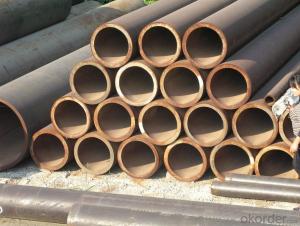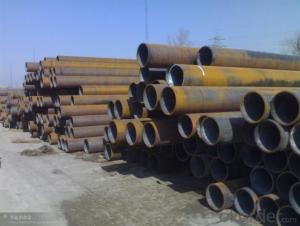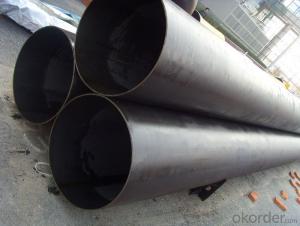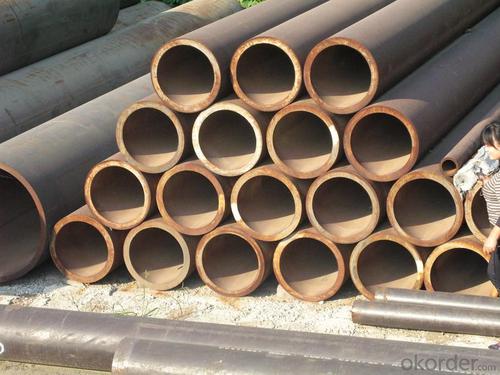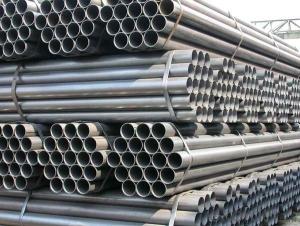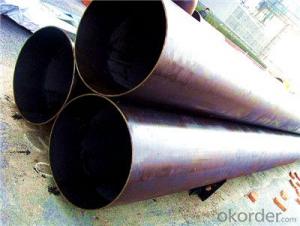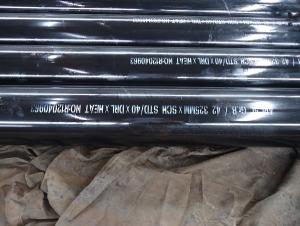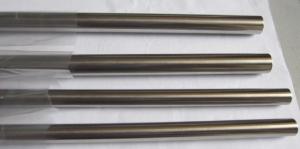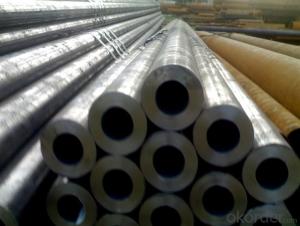Seamless Ferritic Alloy-Steel Pipe for High-Temperature Service structural steel price per ton
- Loading Port:
- Shanghai
- Payment Terms:
- TT OR LC
- Min Order Qty:
- 1000 kg
- Supply Capability:
- 10000 kg/month
OKorder Service Pledge
OKorder Financial Service
You Might Also Like
ASTM A335 seamless ferritic alloy-steel pipe for high temperature service
1)Standard:A335
2)Material:P1,P2,P5,P5-b,P5-c,P9,P11,P12,P22,P91,P92
3)Size: OD. 10-650mm,WT.1-80mm.
Application:Boiler, electricity, mechanical, gas cylinder, chemical, offshore and oil service.
Surface Finishing:Anti-corrosion and high-temperature resistant with black painting.
Packing:Bundles, seaworthy wooden cases.With or without end caps, varnish or as per clients requirements.
ASTM A335 is a ASTM standard specifies Seamless Ferritic Alloy Steel Pipe for High-Temperature Service. ASTM A335 pipe ordered to this specification shall be suitable for bending and similar forming operations, and for fusion welding. Selection will depend upon design, service conditions, mechanical properties, and high-temperature characteristics.
ASTM A335 Seamless Alloy-Steel Pipe
Standard: BS 1139, BS 3059-2, JIS G3454-2007
Grade: 10#-45#, 15NiCuMoNb5, 10Cr9Mo1VNb
Detailed introduction to ASTM A335 seamless alloy steel pipe:
ASTM A335 seamless alloy steel pipe
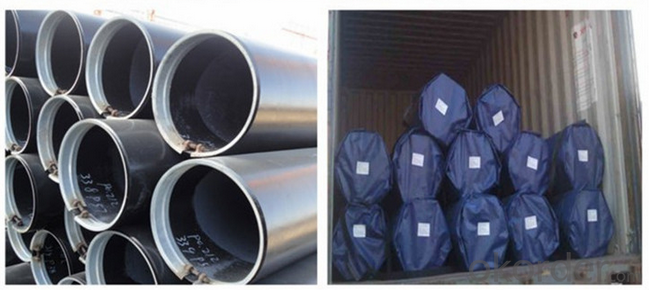
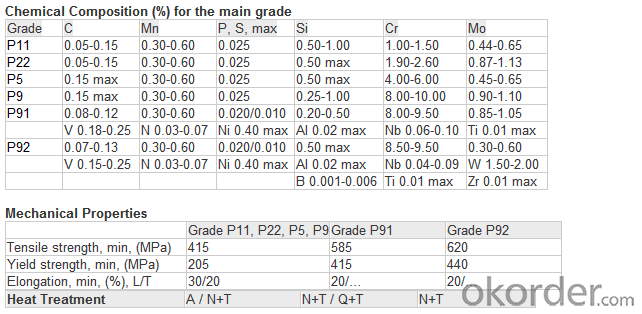
FAQ:
1) why you chose us ?
Professional Manufacturer and supplier of Steel pipe
More than 14 years’ professional producing experience
We can get the lowest ex-factory prices. The price are quite reasonable and it is lower than our commercial peers. also, we can guarantee the qualities of our products.
BV, ISO certificates and SGS test can be provided to assure the quality of our products.
2) Our minimum order quantity:
10 Metric Tons or one 20ft or 40ft Container.
3) How about the Delivery Time?
The steel pipe will be produced since we getting your deposit by T/T or Your original L/C. For normal size, some stocks in our factory now, we can supply once you need.
4)What kind of payment does your company support?
T/T, 100% L/C at sight, Cash, Western Union are all accepted.
5) Do you charge for the samples?
According to our company principle, we just charge for samples, you pay for the freight /courier charge.
6) Main market:
Mid East, South America, Africa, Southeast Asia, India etc
- Q: Are steel pipes affected by UV rays?
- Yes, steel pipes can be affected by UV rays. Over time, exposure to UV radiation can cause the steel to degrade and weaken. It can lead to surface oxidation, discoloration, and in extreme cases, structural damage. To prevent this, protective coatings or paint can be applied to shield the steel pipes from UV rays.
- Q: Are steel pipes resistant to corrosion?
- Yes, steel pipes are generally resistant to corrosion due to the protective layer of oxide that forms on their surface, but their resistance can vary depending on the specific grade of steel and the environment they are exposed to.
- Q: What are steel pipes used for?
- Steel pipes find extensive use in a diverse range of industries, serving various purposes. Among the most prevalent applications, steel pipes are commonly employed for the transportation of fluids and gases. In oil and gas pipelines, for instance, steel pipes are utilized to convey oil, natural gas, and other petroleum products across long distances. Additionally, steel pipes are utilized in domestic and industrial water supply systems. Within the construction industry, steel pipes play a pivotal role in structural tasks, offering exceptional strength and durability. Consequently, steel pipes are highly suitable for the construction of buildings, bridges, and other infrastructure projects. Due to their capacity to withstand heavy loads and provide stability, steel pipes are also employed in the construction of high-rise buildings. Moreover, the manufacturing industry heavily relies on steel pipes. These pipes are utilized in the production of machinery, equipment, and vehicles. In bulk handling systems, steel pipes are commonly employed to transport materials like coal, ore, and grain. Furthermore, steel pipes contribute to the manufacturing of automotive components such as exhaust systems, chassis, and suspension parts. In the energy sector, steel pipes serve a multitude of purposes. For instance, they are employed in power plants for the transportation of steam and hot water, as well as in the production and distribution of electricity. Additionally, steel pipes are utilized in the renewable energy sector, particularly in the construction of wind turbine towers and solar panel frameworks. In addition to these primary applications, steel pipes are also utilized in plumbing systems, irrigation systems, and the construction of fences and railings. Their versatility allows for customization, meeting specific requirements in terms of size, thickness, and coating. Ultimately, steel pipes fulfill an indispensable role across numerous industries, facilitating the transport of fluids, the construction of infrastructure, and the manufacturing of various products. Their strength, durability, and adaptability make them a preferred choice among engineers and professionals in various fields.
- Q: What are the uses of welded steel pipes?
- Low pressure fluid conveying galvanized steel tube (GB/T3091-1993) is also called galvanized pipe, commonly known as white tube. It is used for hot water, gas, air, oil, heating, steam, warm water and other generally low pressure fluid or other hot dip galvanizing (furnace welding or welding) steel pipe. The wall thickness of the steel pipe is divided into ordinary galvanized steel pipe and thick galvanized steel pipe. The end of the pipe is divided into non - threaded galvanized steel pipe and threaded galvanized steel pipe. The specification of steel pipe is expressed by nominal caliber (mm). The nominal diameter is the approximate value of the inner diameter. Usually used in inches, such as 11/2.
- Q: What is the importance of corrosion resistance in steel pipes?
- The importance of corrosion resistance in steel pipes is significant as it helps to extend the lifespan of the pipes, ensures their structural integrity, and maintains the quality of the fluid or gas being transported. Corrosion can lead to pipe failures, leaks, and contamination of the contents, resulting in costly repairs, environmental hazards, and potential safety risks. Therefore, incorporating corrosion-resistant properties in steel pipes is crucial for their long-term performance, durability, and overall efficiency.
- Q: What is the cost of steel pipes compared to other materials?
- The cost of steel pipes is generally higher compared to other materials due to its durability, strength, and versatility. However, it provides excellent long-term value and is often preferred for its reliability and resistance to corrosion, making it a worthwhile investment for various applications.
- Q: Are steel pipes suitable for transporting fluids?
- Yes, steel pipes are suitable for transporting fluids. They have high tensile strength, durability, and resistance to corrosion, making them an ideal choice for transporting various fluids, including water, oil, gas, and chemicals, over long distances. Steel pipes are commonly used in industries such as oil and gas, water treatment, and manufacturing due to their ability to withstand high pressure and temperature conditions.
- Q: Can steel pipes be used for underground water supply pipelines?
- Indeed, underground water supply pipelines can utilize steel pipes. The reason for the widespread use of steel pipes in water supply systems is their ability to endure, their strength, and their resistance to corrosion. They can withstand high levels of pressure and can accommodate large quantities of water. Furthermore, steel pipes come in a variety of sizes and thicknesses, granting flexibility in the design and installation of underground water supply pipelines. However, it is crucial to ensure that the steel pipes are appropriately coated or lined to avert corrosion and uphold the water's quality during transportation. Regular inspections and maintenance must also be carried out to prevent any potential problems with the steel pipes.
- Q: What are the common sizes of steel pipe fittings?
- The common sizes of steel pipe fittings range from 1/8 inch to 24 inches in diameter.
- Q: Are steel pipes suitable for high-pressure applications?
- Yes, steel pipes are suitable for high-pressure applications. Steel pipes are known for their strength and durability, making them ideal for handling high-pressure applications. They can withstand the internal pressure exerted by fluids or gases under high pressure without deforming or bursting. The high tensile strength of steel allows it to resist the forces that occur in high-pressure environments, ensuring the safety and reliability of the piping system. Additionally, steel pipes can be manufactured with thicker walls to further enhance their ability to withstand high pressures. Steel pipes are widely used in industries such as oil and gas, petrochemical, power generation, and water distribution, where high-pressure applications are common.
Send your message to us
Seamless Ferritic Alloy-Steel Pipe for High-Temperature Service structural steel price per ton
- Loading Port:
- Shanghai
- Payment Terms:
- TT OR LC
- Min Order Qty:
- 1000 kg
- Supply Capability:
- 10000 kg/month
OKorder Service Pledge
OKorder Financial Service
Similar products
Hot products
Hot Searches
Related keywords
